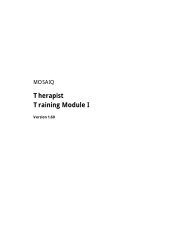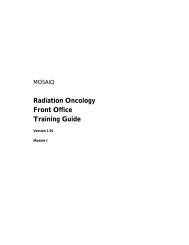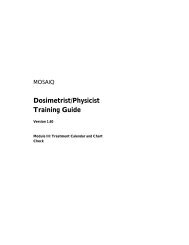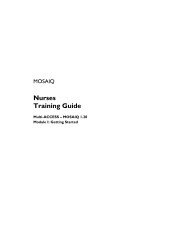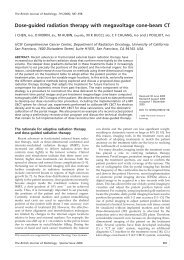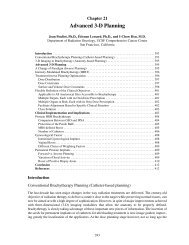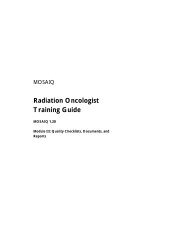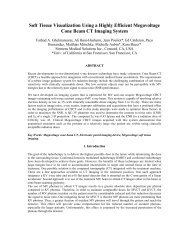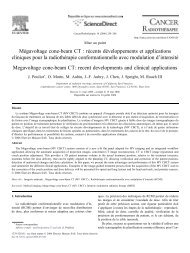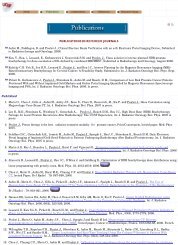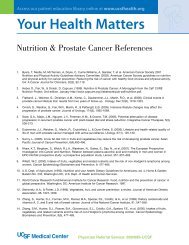IB Senior Educational Objectives - UCSF Radiation Oncology
IB Senior Educational Objectives - UCSF Radiation Oncology
IB Senior Educational Objectives - UCSF Radiation Oncology
Create successful ePaper yourself
Turn your PDF publications into a flip-book with our unique Google optimized e-Paper software.
Rev. 9/14/10<br />
3. Be responsive to the needs of the referring/primary healthcare team; completing<br />
patient-care tasks in a timely and responsible manner (especially in the inpatient<br />
setting) so as not to delay or impede patient’s further care or discharge from the<br />
hospital.<br />
4. Demonstrate a commitment to excellence and on-going professional development.<br />
5. Function well as a member of the team.<br />
6. Practice in an ethical manner with regard to provision or withholding of care,<br />
confidentiality of PHI, and informed consent.<br />
7. Maintain comprehensive, accurate, and timely medical records.<br />
8. Function as role models and mentors for junior residents.<br />
SYSTEM-BASED PRACTICE<br />
<strong>Senior</strong> residents will demonstrate an awareness of and responsiveness to the health care system and<br />
ability to call on resources to provide care. They are expected to:<br />
1. Understand how their professional patient care practices affect other health care<br />
professionals, the healthcare organization and the community.<br />
2. Practice cost-effective health care that does not compromise quality of care.<br />
3. Advocate for quality patient care practices and help patients navigate through<br />
complexities in the healthcare system.<br />
4. Be able to partner with healthcare managers and providers to access, coordinate, and<br />
improve health care; be aware of how these activities affect system performance.<br />
LIST OF SPECIFIC EXPECTATIONS<br />
The following is a list of specific expectations for resident physicians in training at <strong>UCSF</strong> while<br />
assigned to the Neuro-<strong>Oncology</strong> Service In <strong>Radiation</strong> <strong>Oncology</strong>. The goal of the list is to facilitate<br />
learning, improve patient management skills, and to improve knowledge of relevant literature and its<br />
application to the individual patient.<br />
1. Be prepared to discuss relevant literature with attending physician(s). Literature<br />
should be reviewed in advance of patient presentation to the attending physician.<br />
The reference reading list will be located on the department server and many<br />
seminal articles which apply to the daily practice will be provided on the server in<br />
the PDF format. Additional reading recommendations will be made by the<br />
attending physician as indicated.<br />
2. Attend relevant CNS conferences:<br />
a. Pediatric and Adult Neuro-<strong>Oncology</strong> Conference (Thursday, 12:30 – 2:30 pm,<br />
weekly)<br />
b. Radiosurgery Conference (Thursday, 2:30 – 3:30 pm, weekly); starts immediately<br />
after the Neuro-<strong>Oncology</strong> Conference<br />
c. Skull Base Conference (Thursday, 3:30 – 4:30 pm, first week of every month)<br />
d. Spine Tumor Conference (Wednesday, 7:30 – 8:30 am, third week of every month)<br />
e. CNS Chart Rounds (Wednesday, 8:00 – 9:00 am, weekly)<br />
3. Check and sign port films with the attending for on-treatment patients weekly.<br />
4. Gamma knife: Participate in the simulation, planning, and treatment delivery of<br />
radiosurgical procedures. The residents are expected to remain in the Gamma<br />
knife control area for the entire duration of the patient’s procedure. They are also<br />
responsible for helping the attending physician position the patient for treatment<br />
and then for helping to remove head frame post-treatment. They are also<br />
expected to assist the attending physician with providing patients post-treatment<br />
3




